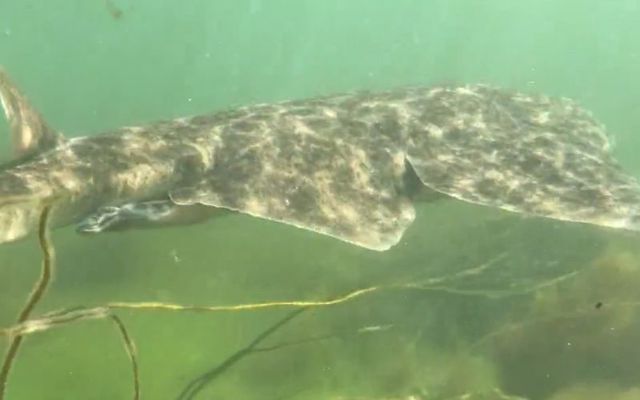A kayaking instructor in Galway captured "incredibly rare" footage of an endangered angel shark swimming in Galway Bay in May.
Angel sharks were once a common sighting in the Atlantic Ocean, but their numbers have been rapidly declining in European waters since the 1960s due to recreational and commercial fishing.
Classified as critically endangered by the International Union for Conservation of Nature, angel sharks inhabit seabeds at depths of roughly 150 meters but have a tendency to swim out to deeper waters where they are often unintentionally caught by commercial fishing fleets.
They are now rarely seen in Europe outside of four areas - Tralee, Galway, and Clew Bays in Ireland and Cardigan Bay in Wales.
At the end of May, Colin O’Loan, a kayaking instructor in Galway, and fellow instructor Ronan Breathnach were taking a group of 10 to 15-year-olds on a kayaking expedition in Galway Bay when they came across an angel shark swimming near the surface.
O'Loan told the Irish Times that the shark was swimming in a shallow area of the bay, adding that he believed it was a ray at the time.
When he got home and reviewed the footage, however, O'Loan realized that he had captured rare footage of an angel shark.
Maurice Clarke, a shark expert with the Galway-based Marine Institute described the footage as "really, really special".
"Many people have been searching for a long time for such good footage," Clarke told the Irish Times.
"They have been hunted to low levels, due to recreational fishing in the 60s and 70s and later from being a by-catch of commercial fishing fleets."
Angel sharks prey on small fish, crustaceans, and mollusks and are generally docile and no threat to humans. However, they have sharp teeth and powerful jaws and can inflict painful bites if provoked.
Their habit of remaining perfectly still while hunting for prey makes them easy to touch and their natural defense mechanism is to strike when grabbed or threatened.
Incredibly rare angel shark in Galway this morning. Confirmed by The Marine Institute. @rtenews @InlandFisherIE pic.twitter.com/CiNfInM1Pk
— Colin O'Loan (@irishcharcoal) May 28, 2023
*Originally published in May 2023. Updated in July 2023.




Comments